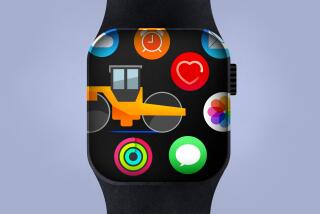It Could Help Apple to Think Different and Be a Follower
- Share via
A big selling point for anything technological these days is “first mover” bragging rights. To be the first out with (and potentially, the “Amazon.com of”) almost any new idea, product or service seems to hold an irresistible allure for venture capitalists and day traders.
Actually, while timing is everything, being first is far from a guarantee of success--or necessarily even a good idea. Few companies demonstrate this as clearly as Apple Computer.
Apple has suffered through some ahead-of-its-time debacles. Lisa, a costly, abortive predecessor to Macintosh; Newton, the hand-held blunder; and eWorld, Apple’s brief and pathetic foray into building an Internet-based community, all failed miserably yet contained ideas that were widely copied and ultimately exploited successfully by others (and Apple itself).
At the same time, Apple has always been the most prescient computer maker--with the possible exception of Dell for its direct-to-customer sales model.
Apple’s trend-setting triumphs--the Macintosh operating system, LaserWriter printer, HyperCard (the original hypertext authoring system), QuickTime multimedia software and the iMac, to name a few--are deservedly legendary.
Those products shared three characteristics: They worked well, offered useful, unique innovations and were timed right--the market was ready to receive them.
The iBook portable with its AirPort wireless networking system, released last week, could well claim a place in the pantheon of creativity. That means a precious few months of superiority for Apple--a key to pulling in the customers and opinion leaders that strengthen the Macintosh platform.
Of course, Windows PC makers, while less imaginative, are far from stupid. They inevitably catch up and will collectively overwhelm Apple unless it keeps the innovations flowing.
That means Apple must continually refresh its product line and move ahead on modernizing its operating system. But how should Apple think different in new areas?
To keep the Macintosh moving as a meaningful counterpoint to the Windows world, I offer four modest ideas whose time has come:
* Jump on the hand-held bandwagon.
In 2000, the hand-held computer will go mainstream. Apple should release two hand-helds based on 3Com’s Palm organizer. An economy model--the “iPad” (you heard that name here first)--should continue the iMac’s colorful whimsy. A “pro” model should be an executive toy that exploits Apple’s newfound expertise in wireless networking and redeems the Newton fiasco with workable handwriting recognition--a technology that Apple was finally getting the hang of before the Newton’s demise.
* Become a serious venture capitalist.
In the Wintel world, Microsoft and Intel tend to invest in divergent ways. Microsoft buys companies and absorbs their products or technology. Intel gives seed capital to start-ups so it can keep an eye on them and ensure that their products serve Intel’s long-term interest in selling more and faster microprocessors.
Apple is now sitting on $3 billion in cash. Why not invest $1 billion the way Intel would? Buy stakes in Internet start-ups to steer their development efforts toward Apple technologies such as QuickTime, to ensure that their products are Mac-friendly and to gather intelligence on who and what will shape the Internet economy in the coming months and years.
* Become a tax collector for the Web.
To understand what I mean, first look at America Online and Amazon.com, two of the Web’s key players. Amazon may be more revered as an innovator and leader, but consider last quarter’s returns: AOL tripled its earnings to $156 million, while Amazon multiplied its losses sixfold to $138 million.
Apple should take AOL’s hint and quickly exploit the opportunity to become the default Internet service provider for all Mac buyers, offering a rebate in return for a long-term contract at a rate that undercuts the major ISPs’ standard $20 a month. To avoid overreaching its expertise, Apple could initially hire one of the more competent ISPs to administer its operations.
This idea is hardly new, but it is timely--many PC makers are diving in or at least thinking it over, partly because it can be a lucrative side business in a period of plummeting PC prices. And Apple’s current default service provider, EarthLink, is the rumored takeover target of PC competitor Gateway.
“Your partner today could be your enemy tomorrow,” said industry analyst Tim Bajarin of Creative Strategies.
Apple could appeal to millions of Mac enthusiasts by creating a custom resource center that doubles as a default home page--loaded with free software to download, product news, e-commerce offerings and discounts.
* Selectively license the Apple brand.
This one is tricky; Apple’s brand may be its most valuable asset. But why not license it to producers of other innovative products that are not so complex as to invite failure (and sully the brand), but could still extend Apple’s reputation--such as electronic books?
Apple needs to keep moving quickly. But in light of an inspiring revival from the near-death experience of recent years, it’s also worth noting that now would be a good time to breathe a sigh of relief as well. Some diversity in computing yet survives the relentless Wintel steamroller.
“What can Apple do for an encore? It’s good that we can ask that question,” said Daniel Kunstler, an analyst with investment bank J.P. Morgan in San Francisco. “We certainly want Apple to be aggressive, but let’s enjoy this for a while first.”
*
Times staff writer Charles Piller can be reached at charles.piller@latimes.com.






